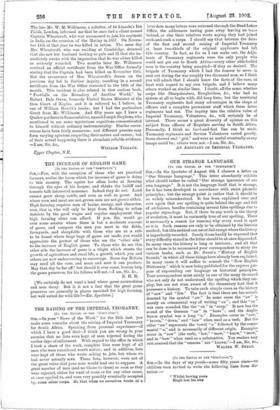OUR STRANGE LANGUAGE.
[To THE EDITOR OF THE " SPECTATOR.1 SIR,—In the Spectator of August 9th I observe a letter on " Our Strange Language." This letter abundantly exhibits what should rather be called " Our strange ignorance of our own language." It is not the language itself that is strange, for it has been developed in accordance with strict phonetic principles ; but the strange point is rather that it should be so widely misunderstood. It has been explained over and over again that our spelling is quite behind the age and full of archaisms, besides containing several false spellings due to popular etymology. But, if there be any truth in the theory of evolution, it must be eminently true of our spelling. There is necessarily a reason (or reasons) why every word is spelt as it is. Such reasons are only to be obtained by the historic method; but this method can never fail except where the history is imperfectly recorded. Surely it can hardly be expected that every difficulty stated in the letter should be at once disposed of. In many cases the history is long or intricate ; and all that can be done is to recommend your correspondent to study the various books, such as Dr. Sweet's " History of English Sounds," in which all these things have already been explained. In many cases it will suffice to consult the "New English Dictionary," which is now being published for the express pur- pose of expounding our language on historical principles. Your correspondent must surely be one of the many thousand who not only do not understand the spelling which they em- ploy, but are not even aware of the elementary fact that it possesses a history. To take such simple cases as the history of " cow " and " low." The fact is that there are two sounds denoted by the symbol "ow." In some cases the " ow " is merely an ornamental way of writing " ou " ; and this " ou " was once sounded, like the " ou " in " soup." It now has the sound of the German " au" in " haus " ; and the Anglo- Saxon symbol was a long "u." Examples occur in "cow," " brown," " down," and " bow " when used as a verb. But the other "ow" represents the vowel " o " followed by the conso- nantal " u," and is necessarily of different origin. Examples occur in " row" (the verb), " low," " mow," " know," " snow," and in " bow " when used as a substantive. You readers may rest assured that the " reasons " are " known."—I am, Sir, &c.,
WALTER W. &MAY.






































 Previous page
Previous page